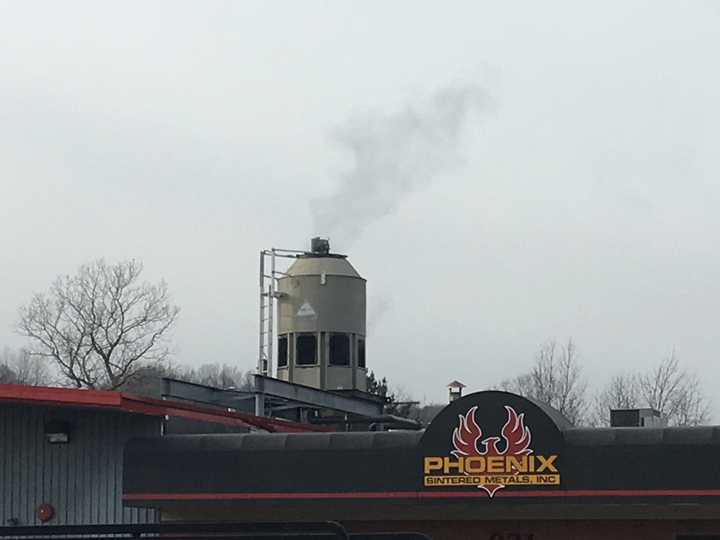For metalworking operations using extreme heats, engineered plastic cooling towers provide effective cooling without corroding, outlasting traditional alternatives.
Corrosion Resistant Plastic Cooling Towers Cut Costs for Sintering Operations
Carlo Chatman | Delta Cooling Towers, Inc.
When it comes to process cooling, few industries rely on the application of heat as much as the sintering process in powder metal manufacturing. With temperatures in the “high-heat” section of a sintering furnace reaching several thousand degrees Fahrenheit, the parts must be dramatically cooled before they can be handled safely by operators.

Sintering is a process by which metal particles are chemically bonded and formed by heat and pressure without reaching the point of total liquefaction.
To accomplish this, powdered metal and alloy mixtures are compacted into near-net shapes, typically using a high pressure press. The compacted material must then be placed in a sintering furnace to improve the bonds and harden the material to the desired final specifications.
To expedite the temperature reduction process, cooling towers are commonly used to circulate water through a jacket that cools the air surrounding the part.
Unfortunately for sintering, metalworking and other industrial processes, the most common type of cooling towers are constructed of galvanized steel and so are susceptible to corrosion and rust problems that can increasingly require ongoing maintenance, often causing expensive process downtime along with repair costs.
Structure Maintenance Solutions, Drawbacks
For Phoenix Sintered Metals, LLC, a powdered metal part manufacturer, a galvanized cooling tower the company inherited when it purchased the facility was so corroded it was losing water (and expensive water treatment chemical) at an alarming rate. In addition, patching was only slowing, but not preventing, the issue.
“We were losing a lot of water out the bottom of the cooling tower on a daily basis because of the leaks,” explains Josh Crawford, Maintenance Supervisor at Phoenix Sintered Metals.
Unfortunately, for aging galvanized cooling towers, this scenario is not unique. Metal cooling towers are under constant attack by salt air or the caustic atmosphere of many industrial sites. Minerals in hard water as well as its pH level can also contribute to corrosion.
To combat the slow, inevitable deterioration, plant personnel are often tasked with patching panels and holes. This work only increases before the cooling tower is eventually replaced. Even with diligent maintenance practices and cooling water chemistries, galvanized cooling towers typically must be replaced every 7-12 years.
“We were spending a lot of time trying to patch cracks in the floors and we were able to contain it a little bit, but never able to completely stop it. As time went on, the cooling tower continued to rust and the problem became worse,” adds Crawford.
The cooling tower, having been relocated from a shuttered, second location prior to the acquisition of the business, was also oversized for the current operation by about 60%.
While this did not impact the unit’s cooling capability, an oversized unit adds to operating costs in terms of electricity to operate fans and pumps, as well as water replacement and specialized water chemistries.
Eager for a more permanent solution, Crawford contacted ProChemTech, a company that provides cooling water chemistry, systems design and engineering solutions, to inspect and evaluate the system.
“The previous ownership used that tower for quite a few years,” says Bill Foringer, plant manager at ProChemTech. “Initially, [Phoenix Sintered] considered refurbishing it, but that isn’t cost effective when you need new fan, motor, base and pan – it can get quite expensive. So, at that point we started looking at new cooling towers.”
Engineered Plastic Cooling Towers
When asked to make a recommendation, ProChemTech suggested a HDPE (high-density polyethylene) plastic cooling tower from Delta Cooling Towers (www.deltacooling.com), one of the industry’s leading manufacturers of engineered plastic cooling towers since 1971.
Delta Cooling Towers offers a full line of factory assembled and modular plastic cooling towers in capacities up to 2,500 tons for a wide range of metalworking applications. Made from corrosion-proof engineered plastic, the low maintenance, seamless “one-piece” shell design has no joints, seams, panels, gaskets, bolts, fasteners or caulking like conventional towers.
“What drew our attention right away is that we wouldn’t have to worry about the rusting of the shell,” says Crawford. “Granted, had we purchased a new, galvanized tower it wouldn’t require much upkeep at first, but eventually it would get to that point where we would have those same issues.”
The design selected by ProChemTech was the T125i model. The Paragon Induced Draft Tower features a counter flowing tower design available in single module capacities from 55 to 250 cooling tons.
Crawford was also impressed by the cost and length of warranty associated with plastic cooling towers. Because HDPE towers are unaffected by corrosives, they require little maintenance and provide a much longer service life. Delta cooling towers, for example, all have a 20-year warranty.
“The cooling tower was a little cheaper than galvanized and had a better warranty as well,” says Crawford.
According to Crawford, the unit was installed in July, 2016 by a local contractor recommended by ProChemTech and has been working well since.
The content & opinions in this article are the author’s and do not necessarily represent the views of ManufacturingTomorrow
Comments (0)
This post does not have any comments. Be the first to leave a comment below.
Featured Product

